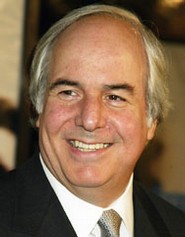How Frank Abagnale Would Swindle You
During his years as a globe-trotting confidence man, Frank Abagnale passed $2.5 million of phony checks in every U.S. state and 26 countries. Now, as a teacher at the FBI academy, the real-life inspiration for the movie Catch Me If You Can trains law enforcement officials to prevent the very crimes he once committed. Abagnale recently spoke with U.S. News about how check forgery has changed over the years, why it remains such a problem today, and how he would swindle consumers—if he were still a bad guy. Excerpts:
How big of a problem is check forgery today?
I teach check forgery at the FBI academy. I really, honestly, truly
believed 10, 15, 20 years ago that I would not be talking about it
still today. It's amazing to me that check forgery is now at about $20
billion a year, up from about $12.6 billion in 1996. There was an
increase in check forgery of over 25 percent last year. It's such a
simplistic crime, and we are still very much a check-user society, so
checks are still part of our payment system.
How is check forgery different today from when you were doing it?
What is amazing to me is that when I forged checks 40 years ago, I needed a Heidelberg printing press.
The press was $1 million. It was 90 feet long; it was 18 feet high. I
noticed that Steven Spielberg went out and found one [for Catch Me If You Can],
and he remembered in my book that I built a scaffolding on either side
of it so I could get up to the top of it to operate the press. There
were color separations, negatives, plates, type settings. There was a
lot of work and effort and time and skill going into creating a check.
Now, because of technology, all someone does today is basically sit in their hotel and look out the window and look for a victim. If they see, for example, U.S.News & World Report's building, then they basically just go to their laptop [and] in a matter of minutes, they [can create] a beautiful, four-color check from that company. So the technology is amazing, and it has made it so simple to do—and that's one of the reasons it's such a very popular crime today.
So a fraudster can make a forged check on his home computer that can pass as a real one?
Absolutely. To be honest with you, most of the forgeries I've seen—and
I look at a lot of them—they are better than the actual company's
check. And they've made it much more creative in color.
What else makes check forgery so common?
All these crimes are everything about risk and reward. Criminals look
at identity theft and say only 1 in 700 criminals gets convicted of it.
And they look at check forgery and they know that for every 1,400
forgers arrested, only about 123 get convicted and about 26 go to jail. So the rewards are great, but the risks are very slim. So that's one of the reasons that make it very popular.
What's a specific type of check forgery that consumers should be aware of?
Check washing—it's back. This is a crime that disappeared 30 years ago.
I used to do it. [Years ago] you only could do it with bleach. So check
companies got smart about it, and they made bleach-sensitive paper and
the crime went away. Today, there are about 21 household chemicals that
everybody has that do the same thing that bleach did.
So let's say you're a fraudster looking to make a couple of quick bucks, what might be a scam you would run?
The simplest way to do that is you go to a city, for example, let's
take Tulsa, Okla. The largest employer in the state is American
Airlines, because this is their maintenance base and their operations
base and so on. So I'm going to use American Airlines because everyone
knows that 17,000 people that live here are employed by them. So I'm
going [to make a phony] American Airlines check, and I'm going to make
it out to myself for $500 or $600. Then, all I do is go around to all
of these grocery stores, Safeway, Kroger, all these [stores] where they
have the courtesy booth. And they will cash a payroll check
for you. They sometimes charge you 50 cents or $1.50, but they will
cash it for you. But what I'm selling them is the name. The check can
be totally wrong; the information can be wrong. [But] all the clerk
says is, "Oh, American Airlines, well, we know that their check is
good."
So they'll cash it—not to mention all the check cashers you have today that weren't around when I did these things. And the check cashers, you go to them and cash it, they don't even require identification. So if you start going around and you've got a $550 check and you go to, say, 10 Kroger stores, you can make a lot of money just in a day.
And again, you're making these checks on a personal computer?
That's it. You are making it out to whatever name you want to make it
out to, whatever address you want to put on it, and off you go.
Tools: ![]() Share
|
Yahoo! Buzz
| Comments (14) | Print
Share
|
Yahoo! Buzz
| Comments (14) | Print
Reader Comments
Reward, Repay
I am glad to know Frank paid back what was stolen.
In that aspect, he is my hero! Don't demand what you cannot
give to others in life.
YOUR A HERO
u should educate the phillipne commutnity we believe in you!
Heroe
Frank William Abagnale.... I don't even know what to say, all my respect is for him. He knows how to live i give him that much! He is just one of my heroes, i think what he has done was just so right. I think the best period of life is from the age of 14-25, and Frank knew it. He had the opportunity to live the best time of his life the way it should be, and he'd simply just gone for it, he would have been stupid if he didn't do it! It must be good to wake up one day knowing you are a man who actually lived life.
advertisement










